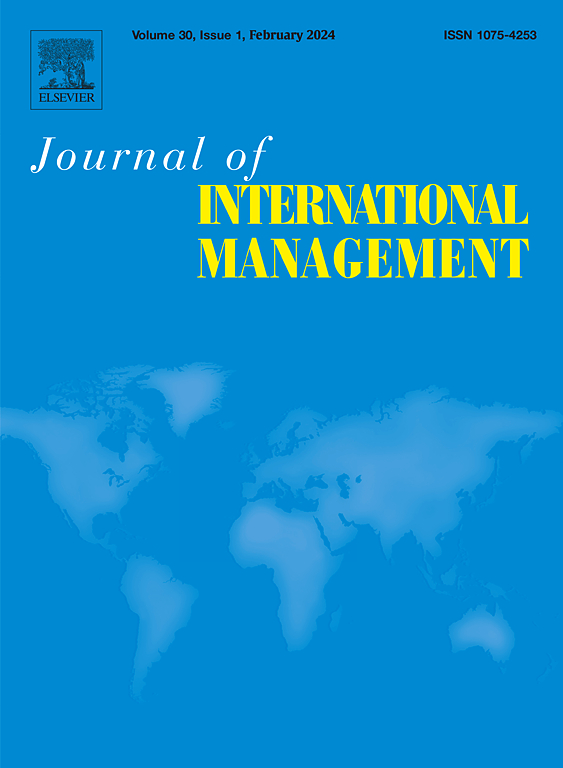Transcending conflict in global virtual teams: Multi-level effects of cultural intelligence and perceptions of conflict on subjective and objective outcomes
IF 5.9
2区 管理学
Q1 MANAGEMENT
引用次数: 0
Abstract
We employ a multilevel Input-Mediator-Output (I-M-O) analytical approach to study cultural intelligence (CQ) as an input variable that reduces team conflict frequency and asymmetry in individual conflict perception, acting as mediators and, consequently, influences global virtual team (GVT) outcomes. The GVT outcomes were measured as objective performance at the team level and subjective outcomes at the individual level. Utilizing 1592 GVTs (consisting of 7029 individuals), we test the effects of CQ on three types of conflict (task, relationship, and process conflicts) and GVT outcomes at both the team and individual levels simultaneously. Results demonstrate that CQ affects team performance outcomes (viz., the team report's quality and creativity as objectively evaluated by outsider reviewers) and subjective outcomes (viz., enjoyment and satisfaction) indirectly via team conflict reduction. At the individual level, CQ affected subjective outcomes indirectly via reducing members' conflict perceptions. The three conflict types influenced GVT outcomes differently, with task conflict exerting a positive effect on team performance and the other two a negative effect. Overall, the study highlights the nuances of the CQ-Conflict-GVT performance relationships and contributes towards better managing GVT's performance-related outcomes simultaneously at the individual and team CQ levels.
在全球虚拟团队中超越冲突:文化智力和冲突感知对主客观结果的多层次影响
我们采用多层次的投入-中介-产出(I-M-O)分析方法来研究文化智力(CQ)作为一个输入变量,它可以减少团队冲突频率和个人冲突感知的不对称性,作为中介,从而影响全球虚拟团队(GVT)的结果。GVT结果被测量为团队水平的客观表现和个人水平的主观结果。利用1592个GVT(由7029个人组成),我们同时在团队和个人层面上测试了文化智力对三种冲突(任务冲突、关系冲突和过程冲突)和GVT结果的影响。结果表明,文化商通过减少团队冲突间接影响团队绩效结果(即由外部评审者客观评价的团队报告的质量和创造力)和主观结果(即享受和满意度)。在个体层面上,文商通过降低成员的冲突感知间接影响主观结果。三种冲突类型对团队绩效的影响不同,其中任务冲突对团队绩效有正向影响,其他两种冲突对团队绩效有负向影响。总体而言,该研究突出了CQ-冲突-GVT绩效关系的细微差别,并有助于在个人和团队CQ水平上更好地管理GVT的绩效相关结果。
本文章由计算机程序翻译,如有差异,请以英文原文为准。
求助全文
约1分钟内获得全文
求助全文
来源期刊

Journal of International Management
MANAGEMENT-
自引率
9.80%
发文量
67
审稿时长
81 days
期刊介绍:
The Journal of International Management is devoted to advancing an understanding of issues in the management of global enterprises, global management theory, and practice; and providing theoretical and managerial implications useful for the further development of research. It is designed to serve an audience of academic researchers and educators, as well as business professionals, by publishing both theoretical and empirical research relating to international management and strategy issues. JIM publishes theoretical and empirical research addressing international business strategy, comparative and cross-cultural management, risk management, organizational behavior, and human resource management, among others.
 求助内容:
求助内容: 应助结果提醒方式:
应助结果提醒方式:


